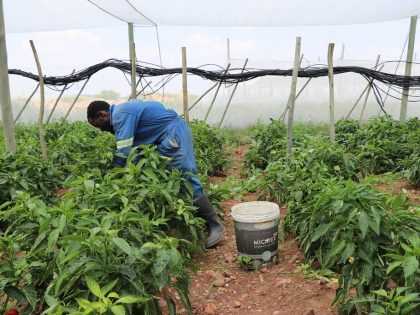Botswana: African miracle or African mirage?
Botswana is usually held up as an exception on the African continent for good economic and political governance. Is this a fair assessment?

President Ian Khama during the 35th SADC Summit held in Gaborone, Botswana. Image Credit: GCIS via Flickr
At the end of last month, Botswana celebrated the 50th anniversary of its political independence from British colonialism. Long celebrated by outside observers as the “African Miracle” or “African success story” for its steady economic growth and seeming political stability, more recently that designation is being called into question.
At independence in 1966, Botswana was a severely impoverished territory, surrounded by hostile and racist white minority regimes in South Africa, Rhodesia (now Zimbabwe), and South West Africa (now Namibia). Botswana was steadfast and vocal in condemning these regimes and provided moral support and refuge to liberation struggle groups, such as the African National Congress of South Africa, even though it was heavily dependent on South Africa economically and for infrastructure.
The country is arid with a physical landscape dominated by the Kgalagadi Desert to the west and the famed Okavango Delta to the northwest. At independence, subsistence agriculture was the main economic activity with cattle keeping being particularly significant to the economy of the country. Diamond mining started in the 1970s and 1980s, and this brought significant revenue to government coffers. The result was the fastest growing economy in the world for the last three decades of the 20th century.
Impressive economic growth enabled the government to provide social amenities, such as health, education, roads and water among others throughout the country. The provision of social services has been heavily subsidized by the state in order to be affordable to the population and in some instances these have been provided free of charge. For instance, Botswana’s small population, which today stands at just above 2 million people, was a little more than a decade ago being decimated by an HIV epidemic. The government moved quickly to provide free antiretrovirals and medical care to people living with HIV/AIDS.
The government has also provided grants and subsidies to the arable farming communities in a bid to boast agricultural production, and to diversify the economy and decrease dependence on diamond mining. Unfortunately, arable farming has seen significant decline despite government efforts.
Despite the impressive economic growth mentioned above, significant numbers of people in Botswana still live in abject poverty. Economic disparities are also reported to be among the worst globally. The economy has not grown in line with the population, hence large numbers of young people, among whom are university or tertiary education graduates, remain unemployed.
Botswana has been a liberal or multi-party democracy since independence – it has held elections every five years and has seen four peaceful presidential transitions – even though only one political party, the Botswana Democratic Party (BDP), has ever held power. Nevertheless, Botswana has consistently been judged the least corrupt country in Africa by Transparency International.
However, for a number of years now, some sections of the population and independent scholars have been voicing concerns about what is seen as the militarization of the public service. Government has also been accused of engaging in grave erosion of civil liberties and authoritarian tendencies. A significant development was the split in the ruling party BDP in 2010, and formation of a new opposition party, the Botswana Movement for Democracy (BMD), by defectors. The defectors argued that internal party democracy had been replaced by autocracy and favoritism in the BDP.
Corruption and rent-seeking in government are also said to be on the rise, with the perpetrators believed to be getting away with it if they are connected to or a part of the ruling elite. These concerns saw the country experience the most competitive election ever in 2014, with opposition parties registering an impressive 52% of the popular vote while the ruling party trailed at 46.7%. The latter managed to hold onto power and President Ian Khama (the son of the founding president, Seretse Khama), in power since 2008, was elected to a second term by the country’s BDP dominated parliament (despite losing the popular vote the BDP still dominated parliament because of the country’s first past the post electoral system).
The Umbrella for Democratic Change (UDC), which is made of up Botswana National Front (BNF), BMD and Botswana Peoples Party (BPP) got 32% of the popular vote, while the Botswana Congress Party (BCP) received 20%. It is highly likely that had the BCP been part of the UDC the opposition may have defeated the BDP. Indications are that the BCP could be part of the UDC for the 2019 elections, which may lead to the first change of government in Botswana.
The BDP has been described as center-right and BNF and BCP as center-left or social democratic. But these labels do not mean much. People or voters are more concerned with service delivery and employment creation than the political orientation of the parties. Young people constitute some 40% of the country’s population and an important voting sector. Ideology means little to them as they worry about lack of economic opportunities and employment.
Furthermore, Botswana remains one of the countries in Africa and the world with the fewest women in parliament, despite an abundance of qualified and available talent.
A new narrative is growing louder, with critics arguing that compared to hugely successful economies, such as Singapore, Malaysia and the United Arab Emirates, which were underdeveloped economies 50 years ago, Botswana is lagging behind. The quality of democracy in Botswana is also said to be in decline, with newer democracies in southern Africa, such as South Africa and Namibia, said to be stronger.


